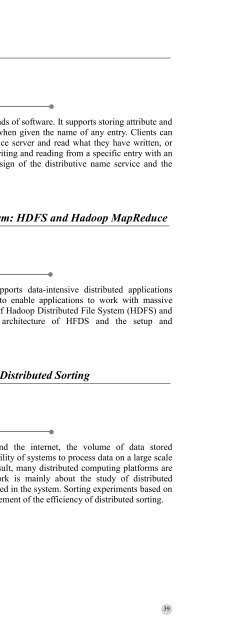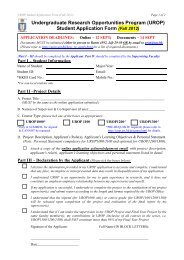UROP Proceedings 2010-11
UROP Proceedings 2010-11
UROP Proceedings 2010-11
Create successful ePaper yourself
Turn your PDF publications into a flip-book with our unique Google optimized e-Paper software.
Psychology of HappinessAdvisor : TAM Kevin K P / SOSCStudent : LEUNG Tsz Chung / BICH(<strong>UROP</strong>1000, Summer 20<strong>11</strong>)During the project period, I participate in lab meetings for discussion of different issuesrelated to the topic on the psychology of happiness. Literature review is conducted in areasincluding the basics of subjective well-being (SWB), methods of examining SWB, variabilityand stability of SWB and the cultural influence on SWB. I have also contributed in the dataentry and verbatim coding of questionnaires on “the relationship between money andhappiness”.Do You Generally Feel Happy, but Not Satisfied in Life?Advisor : YIK Michelle / SOSCStudent : CHAN Perrin / BICH(<strong>UROP</strong><strong>11</strong>00, Spring 20<strong>11</strong>)What determines how happy you are and your subjective well-being? Are there anydifferences between these two concepts, and if so, in what aspects? Many scholars have usedsubjective well-being and happiness interchangeably in literature; however, I believe that theyare not equivalent. In the proposed study, I aim to conduct a survey study to find out whetherthere are differences between these two terms by focusing on the culturally appropriateemotions and ideal affect.The Relationship between Ideal Affect and Normative AffectAdvisor : YIK Michelle / SOSCStudent : DAI Wei / MAEC(<strong>UROP</strong><strong>11</strong>00, Summer 20<strong>11</strong>)In the proposed project, the relationship between ideal affect and normative affect is examined.I focus on two questions: 1. In general, what is the relationship between ideal affect andnormative affect? 2. Does this relationship depend on other factors, such as valence ofemotion, culture, etc.? My hypothesis is that ideal affect converges to normative affect overtime. To test the hypothesis, I design two studies, with the first one testing that ideal affect ismore consistent with normative affect in tight cultures than in loose cultures, and the secondone testing the relationship between ideal and normative affect.82



